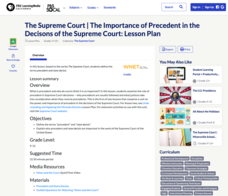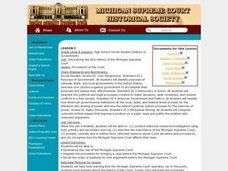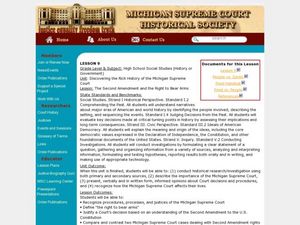PBS
The Supreme Court: The Importance of Precedent in the Decisions of the Supreme Court
People often hear the words precedent and Supreme Court together, but why? A resource on the Supreme Court includes a variety of discussion questions, handouts that guide young historians, a video about Nixon and the court system, and...
PBS
Analyzing McCulloch v. Maryland
What happened in the Supreme Court case of McCulloch v. Maryland? The resource teaches the specifics of the case with a video and provided discussion questions covering issues such as precedent and the Supreme Court as an equal branch of...
Curated OER
How the Supreme Court Affects the Lives of Teens
Students describe the structure and function of the United States Supreme Court. They examine and analyze decisions made by the Court. They participate in a debate about recent issues.
Curated OER
Supreme Court Shake-Up
Students examine the role of the Supreme Court through an interactive program. They analyze the history of the Court and its members. They finally explore how the Supreme Court works.
Administrative Office of the US Courts
Hazelwood v. Kuhlmeier
Freedom of speech is not always free. Scholars investigate how the First Amendment provides for the right to express opinions. Through the court case Hazelwood v. Kuhlmeier, they analyze free speech using primary documents—and hopefully...
PBS
Understanding and Applying the Miranda Decision
How does the Supreme Court Miranda decision affect court cases? Scholars watch a video about the decision, discuss its application in various cases, fill out multiple handouts, and work in groups to better understand how much weight the...
Curated OER
The Legacy of the Warren Court
Learners examine the major decisions by the Supreme Court when Warren was the Chief Justice. In groups, they research the life and other works of Earl Warren and discuss how ones background can influence decisions. They also examine...
Curated OER
History of the Michigan Supreme Court from the Territorial Court and the founding of the Michigan Supreme Court in 1836 to Justice Mary S. Coleman and her interpretation of "One Court of Justice"
Students trace the history of the Michigan Supreme Court from when the state was still a territory. They define procedures as they relate to the Court. They compare and contrast the territorial court to the new Court.
Carolina K-12
Plessy v. Ferguson & the Roots of Segregation
How far in the past do the roots of Jim Crow and segregation extend? Young historians closely consider this question using detailed PowerPoint slides as a basis for discussion rather than lecture, culminating in an activity where class...
Curated OER
Procedures of the Court
Students examine the role of the Michigan Supreme Court. They diagram the procedure one must follow to bring a case before the Court. They discuss the order of business for oral arguments as well.
Curated OER
Michigan Court System (Part 1) (Middle School)
Young scholars identify the courts that make up the Michigan judicial system. They explore the responsibility of each court and diagram how cases move to the Supreme Court. They compare and contrast the different types of courts.
Digital Public Library of America
A Raisin in the Sun by Lorraine Hansberry
A set of 14 primary sources provides background for a study of Lorraine Hansberry's drama, A Raisin in the Sun. Featured are images from stage productions of the play, white supremacy protests, a clip from a television interview, and...
Curated OER
What's the Difference Between Procedural and Substantive Due Process?
Learners discuss the difference between substantive and procedural due process. They research the uses of due process on the internet and books. They also discuss cases involving students and due process.
Curated OER
Judicial Review
Students are introduced to the concept of judicial review. They read an article about this topic and the Bill of Rights. They answer discussion questions and review as a class.
Curated OER
Constitutional Resources
Students explore the Constitution, bill of rights, framers, Supreme court cases and educational games.
Curated OER
Racism, Discrimination, and the Law
Seventh graders examine the various racism and discrimination faced by various ethnic groups in the United States. In groups, they research the legal system and describe the purpose of the United States Constitution. They review cases...
Curated OER
Judicial Review
Students review the concepts they were introduced to in a telecast on judicial review. After reading an article, they answer discussion questions and repeat the same procedure for another article. They participate in a debriefing session...
Curated OER
Near v. Minnesota
Students discuss what free press means and what it would be like without this right. They read the summary from the Near v. Minnesota case. In groups, they analyze a problem and report to the class.
Curated OER
Big Four Baseball
Students identify the justices known as the "Big Four" in the Michigan Supreme Court. They explore their similarities and differences. They examine the cases that were decided by them that have had an impact on the laws in Michigan.
Curated OER
The Institutions of Government: The Judiciary
Students explain the difference between tribal, state and federal sovereignty. Using the internet, they read Supreme Court cases that focus on Native American law. They compare and contrast the view of the case from the Native...
Curated OER
The Second Amendment and the Right to Bear Arms
Students examine procedures and processes of the Michigan Supreme Court. They explain the Second Amendment to others. They compare and contrast two cases dealing with the Second Amendment.
Curated OER
Bill of Rights -- Texas v. Johnson, 1989
Middle schoolers examine the First Amendment of the Bill of Rights. During a visit to the George Bush Presidential Museum, they watch a video about the Texas v. Johnson flag burning case. In groups, they discover the role of the Supreme...
Curated OER
What is Due Process Anyway?
Students examine the term due process and its historical origins. They compare and constrast the requirements of due process in the United States Constitution and the Indiana Constitution. They also discuss the difference between...
Curated OER
Right of Privacy: 4th Amendment
Students are introduced to the 4th Amendment of the Washington state Constitution. In groups, they examine the Constitution of the state of Washington and compare it to the United States Constitution. They role play the role Supreme...

























